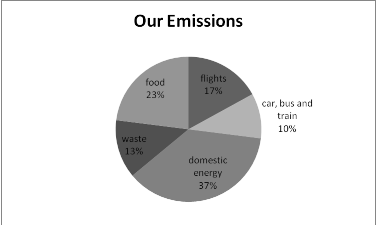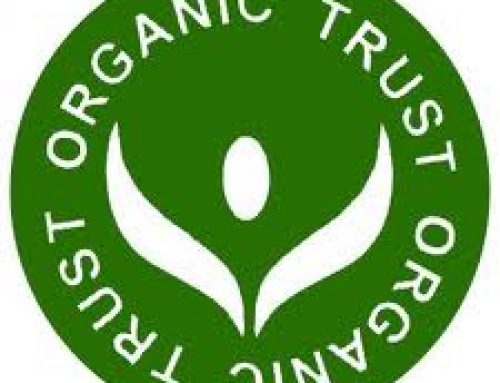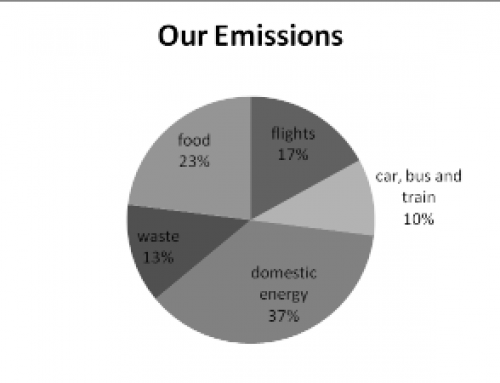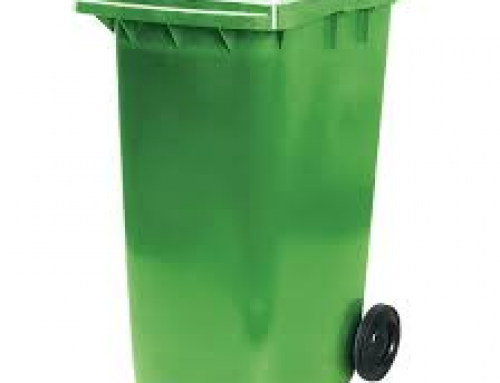READ THIS, SAVE MONEY &
REDUCE YOUR EMISSIONS & HELP SAVE THE ENVIRONMENT
Domestic Waste
The average Birdhill resident’s waste habits are responsible for a column of carbon dioxide one square metre in extent, sitting on top of each wheelie bin & extending upwards into the sky for close to 1km. Various ways of reducing our waste & its resultant emissions are displayed in this triangle which shows prevention of waste is the best way while landfill is the worst. As stated above, our domestic waste counts for approximately ? of our emission’s impact in Birdhill. The overall volume of waste sent to landfill is equal to the volume which we recycle but the landfill waste accounts for 4/5’s of our domestic waste emissions while our recycled waste which accounts for the other 1/5 is mainly exported to countries like China, Spain, England, & Belgium.
Prevention
It is clear that we need to prevent waste accumulation. Simple things like bringing your own bags to the shop & buying items with no packaging can make a difference. Various ways of reducing our waste & its resultant emissions are displayed in the triangle here, which shows prevention of waste is the best way while landfill is the worst. Shannon Cronin a sixth class student in Birdhill National School would like you to know that plastic bottles can last up to 1,000 years and thinks we should reduce our use of plastic and prevent too much packaging. Please join our group of concerned residents & produce less waste and therefore waste emissions. Reducing our waste volumes helps:
- To reduce our global warming impact,
- To protect wildlife habitats,
- To reduce the demand for natural raw materials,
- To reduce the need for landfill space,
- To reduce our refuse bills.
To Reduce is Better than to Reuse which is Better than to Recycle
Each of us needs to reduce the overall amount of waste we produce. Some other tips are:
- Avoid buying heavily packaged goods and buy products such as washing powder, cereals, yoghurts, milk etc. in large containers to reduce packaging,
- Try to grow your own and/or buy loose fruit & veg instead of pre-packed,
- Use refillable & rechargeable products for example ink pen, batteries etc,
- Choose products in packaging that you know can be reused or recycled,
- Use reusable or recycled products wherever possible,
- Take your reusable shopping bags with you to the shops every trip,
- Try to get off mailing lists for junk mail,
- Use & refill your own durable drink bottle,
- Use & refill your own durable yoghurt container,
- Try to keep your bin from filling up,
- Dogs are a useful way of reducing cooked kitchen scraps/waste,
- A foot operated can crusher (above) can reduce the space cans take up by 70%. It is available on offer for just £17.99 plus postage & packing at www.naturalcollection.com,
- When you’re in a supermarket, don’t bother using a separate plastic bag for fruit items such as a bunch of bananas.
Reuse
Have you ever reused an empty ice-cream tub for storing leftovers instead of just throwing it out? Michael Gorman, from the same class as Shannon, keeps it short and sweet with his slogan: “Its not confusing start reusing!”
By reusing items, we save money because we reduce our waste volumes. Reusing items is quick & easy to do – in fact, you’re probably already reusing a lot of household products, so see what else you can do:
Give unwanted clothes, furniture, bric-a-brac or books to family, friends & charity shops. Don’t forget to buy from charity or second-hand shops too & pick up bargains,
Buy a paper briquette maker from www.naturalcollection.com & make your own fuel from waste,
Choose reusable, washable napkins not disposable ones,
Bring old glasses back to the optician for use in the developing world,
Refurbish your sofa instead of buying a new one,
Mend clothes & get shoes re-heeled so they last longer,
Buy products with refillable solutions eg. washing powder, detergents, salt & pepper mills,
Look for long lasting & energy efficient appliances – keep them well-maintained to increase their life cycle & repair them when necessary,
Reuse scrap paper for writing notes,
Use washable dishcloths instead of disposable wipes or kitchen towels,
Take your packed lunch in a lunch box instead of wrapping it in kitchen foil or cling film. But be careful as your lunch box needs to be the right size in order to keep your unwrapped lunch from rolling around,
Avoid buying disposable products eg. razors, paper or plastic cups, plates or cutlery,
Reuse empty jam jars & old ice cream tubs for storage or keeping leftovers,
Don’t accept every paper bag you are offered in the shops bring your own,
Use rechargeable items instead of disposable ones eg. batteries & cameras,
Reuse envelopes by sticking a label over the old address,
Pass on old magazines to others like your doctor or dentist’s surgery,
Buy a vacuum cleaner with reusable/washable or even no bags,
Choose reusable nappies,
Use Styrofoam or broken crockery as drainage in plant pots.
Recycling
A total of 60% of the Birdhill residents use the recycling facilities in Birdhill Village while the others travel to Nenagh and elsewhere. It takes only 25 plastic drink bottles to make one fleece jacket and 176,000 fleece jackets could have been made from the amount of plastic sent to Irish landfill in one year. Many household products can be recycled today like paper, magazines, junk mail, cardboard, aluminium cans, steel cans, plastic bottles, tetrapaks, glass bottles & jars, soft plastic packaging, textiles & clothes, hazardous household waste, timber waste, electrical equipment, batteries, computers, brown goods (TV, radio, etc), white goods (fridge, washing machines, etc), furniture, fluorescent bulbs, ink jet/toner cartridges & mobile phones. Maybe take a look and try to buy recycled goods in your weekly shopping.
It is worth noting that recycling has emissions due to the huge distance this waste is carted around the globe & due to the energy intensive conversion of this waste into something useful. That is why prevention, reduction and reuse are much better than recycling. On a visit to the AES recycling plant we were surprised to find that small yoghurt containers, water & mineral bottles & tetrapaks are not recycled. However larger tubs & bottles are recycled in AES. Try buying yoghurts & minerals in larger bottles & portioning it in washable tupperware containers for school lunch or picnic use. This saves you money & reduces the waste you send to landfill. There is more information on this website: http://www.raceagainstwaste.ie/take_action/at_home/
Composting
About ? of the Birdhill residents compost their raw kitchen waste and this is good because composting dramatically reduces the amount of waste we send to landfill. Composting can reduce your waste volumes by one third, save lots of money & help your garden. Turning your compost and letting air in reduces your emissions too. A lot of your rubbish is kitchen & garden waste & most of this material can be turned into compost by means of a compost heap. You can make a compost bin yourself, purchase one from your local hardware store or from North Tipperary County Council. Compost bins cost little (include a kitchen caddy) & are available at the Machinery Yard Recycling Centre, Limerick Road, Nenagh. Opening hours are (Mon – Fri, 9.30am to 4pm). For further details see www.homecomposting.org.uk
Constructing your Compost Heap
Compost can either be made in a heap or a bin depending on the amount of material for composting & the needs of your garden. The heap may be enclosed using bricks or timber. A compost bin is more suitable for smaller gardens. You could use a large drum or reuse an old bin for your composter. The bin should have open ends & be placed directly on the ground so that the compost inside will come in contact with the soil, allowing earthworms to enter. These speed the decaying process by loosening the compost & permitting air to circulate more freely. The compost heap should be located in an area protected from direct sunlight & heavy rain. This will prevent the compost from drying out or becoming water-logged & will help the composting process. Most organic materials which will readily decompose are suitable for composting. For best results coarse materials should be chopped or ground into small pieces before being added to the heap as this will speed decomposition. Materials which you may add to the compost heap include Garden wastes like grass cuttings, non-woody garden prunings, leaves, flower & veg. remains, Kitchen wastes like veg. peelings & leaves, fruit peelings & cores, cooked table scraps, tea leaves, coffee grounds, egg shells, stale bread & Other Materials like paper & cardboard, sawdust & wood shavings, animal manure, ashes or hoover dust.

Birdhill Tidy Towns Committee and Birdhill National School in conjunction with researchers from the University of Limerick have measured our community’s Ecological Footprint using a survey form which you filled out last April. Our Ecological Footprint is the amount of carbon dioxide emissions that are related to our domestic energy, waste, water & food consumption and personal transport habits – summed up and converted to the amount of land required to absorb this carbon dioxide. We would like to thank all the Birdhill residents who are obviously environmentally conscious for replying to us in such big numbers.
Case Study:
Owen & Aideen Kirby do not have a bin collection as there is no service on their road. They go to the landfill in Ballaghvenney every 5 or 6 weeks with a barrel of waste and a few bags of recyclables. They have a compostor for kitchen and garden waste. “I clear out the compost bin every year, it makes great mulch for the shrub beds,” Owen told us. He added, “When the children’s clothes become too small for them, we pass them on to their cousins. We also give some to St. Vincent de Paul.”

Building and Managing the Compost Heap
For maximum efficiency a compost heap should be built up in layers of about 150mm. Each layer of vegetable matter should be moistened if dry, sprinkled with a thin layer of lime & then covered with soil to avoid attracting flies & the escape of smells. The process is repeated until the heap is the required height. A 20mm layer of “starter” material such as animal manure can be added to the top of each layer to increase the rate of decomposition. Turning the heap with a fork will also speed up decomposition. The more frequently it is turned the faster the material will decompose. If the heap is turned every third day after it is built, the compost should be ready for use in a fortnight. After turning, the heap should be covered with soil. If left unturned the process will take about a year. The heap should be sufficiently moist so the composting material feels damp. However, it should not be allowed to become water-logged as it will soon begin to smell. If the compost becomes too moist, absorbent material such as sawdust, straw or manure can be added & the heap turned regularly. Carelessness can lead to problems with flies, rodents & foul smells. Your compost is mature & ready to use when it has a crumbly appearance & a slightly earthy smell. The compost can then be dug into the top-soil of garden beds, spread under trees & bushes as a mulch, or used to make up a potting mix for houseplants or seedling trays.
Wormeries & Pets
Dogs & cats can be very useful for decreasing your food waste volumes. Their droppings should be added to composters to speed up composting. If you do not have a pet, a wormery will reduce your cooked kitchen waste into fine soil. They will help save money as they reduce your waste volumes.
Food
As stated on the first page, our consumption of food in Birdhill counts for approximately ¼ of the emissions from our homes. On average ? of our diet in Birdhill is meat and dairy and the remainder is fruit and vegetable based. By eating less meat and dairy we can reduce our emissions and help reduce global warming significantly. Some points about food consumption:
1) Only 1/5 of food consumed in Birdhill is produced locally. Locally produced food has less transport miles clocked up when it arrives on your plate. A kiwi fruit requires its own weight in aviation fuel to arrive on your plate while a strawberry yoghurt, and its contents, can have travelled over 3,000 miles to get to your plate. So try buying Irish strawberries, apples or even yoghurts.
2) We found that on average 1/6 of what we eat in Birdhill is out of season. Out of season food usually requires excessive energy use and emissions due to storage freezing, storage cooling, heating of green houses and transport from afar. There is a habit increasing across the world of increasing the growing season of vegetables and fruit through heating soil and greenhouses and this causes unnecessary emissions. There are over 100,000 acres of such greenhouses and this adds to the burden we place on our environment.
3) Just ¼ of the Birdhill residents use some form of organic food. The alternative to organic food is the over use of energy intensive artificial nitrogen-based fertilisers and animal food supplements. These help pollute our atmosphere and our water resources. Where you do not read organic on a food item, think pesticides, insecticides, artificial fertiliser and food supplements. We would not advise people to buy organic where quality labels or knowledge of the producer is absent. Locally sourced organic food reduces your emissions. The Farmers Market in Killaloe (on Sundays), The Farmers Market in Ballina (on Saturdays), The Farmers’ Market in The Stables, University of Limerick (on Tuesdays) and the Milk Market in Limerick can be used to buy locally produced organic food. The organic trust are responsible for setting up standards for organic growers, so look out for their logo.
4) The total area of tropical rainforest has reduced by 50% since 1950. Where once 300,000 orang-utans roamed the earth, less than 50,000 now struggle for survival. Please be careful to take a look at products and where they come from; be especially vigilant not to purchase products using palm oil (typically in tortilla chips, mixed nut and raisins, oatcakes, sunflower spreads, chocolate spreads, quiche, powder vegetable gravy etc).
Winners:
Congratulations to the following pupils who received prizes for their art and slogans:
1. Kevin Connolly (“Make it your goal, stop using coal”)
2. Shannon Cronin (“Please save our planet, it’s the only one we’ve got”)
3. Michael Gorman (It’s not confusing, start reusing”)
4. Ciara Ryan & Megan O’Gorman (“Turning off the tap is so cool, you could fill a swimming pool”)
Case Study:
Christy & Margaret Hogan of Coosane are very conscious of the type of food they provide for their family. They have their own vegetable plot, producing fresh veg and potatoes for the table. They grow apples, blackcurrants, strawberries and peas in the back garden. “I always read labels when shopping, to check the date and source of the food,” Margaret says. “I shop regularly in the local Farmers’ Markets to ensure I get fresh produce and I usually buy natural food rather than something with too many additives.”
For further information on how to reduce your footprint, feel free to contact Vincent Carragher, The Carbon Clinic, Community and Family Resource Centre, Killaoe, County Clare; phone 061 374741 or email vincent.carragher@ul.ie.




